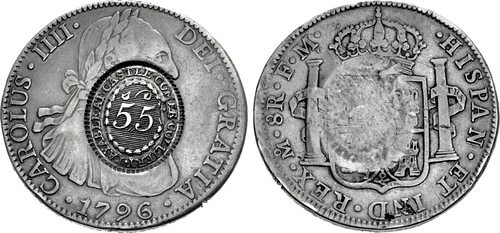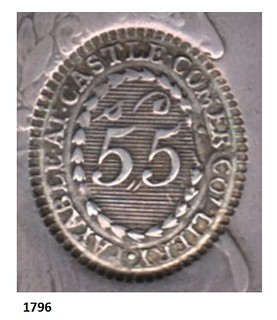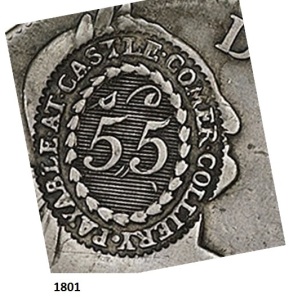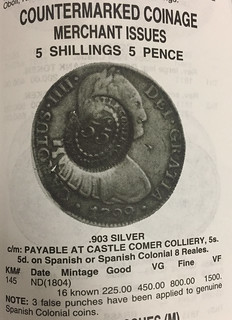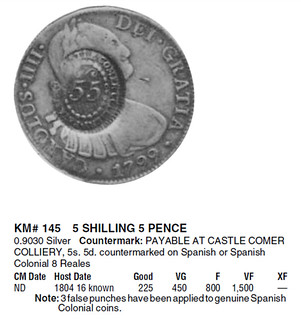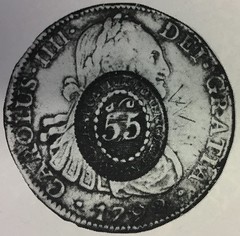
PREV ARTICLE
NEXT ARTICLE
FULL ISSUE
PREV FULL ISSUE
V25 2022 INDEX E-SYLUM ARCHIVE CASTLECOMER COLLIERY COUNTERMARKSLast week Eric Hodge asked for a copy of a photo of an 8 reales countermarked for Castlecomer in Ireland (in the Krause Standard Catalog of World Coins 1801-1900 published in 1999 2nd edition on page 729). Ted Puls and Edward Cohen provided images, but these unfortumately were not the specific photo sought. Meanwhile, other readers provided links to other relevant images. -Editor Bill Dalzell of Classical Numismatic Group writes: "Our firm sold one back in January 2015."
IRELAND, Countermarked coinage. Kilkenny. Castle Comer Colliery. AR Dollar (41mm, 26.63 g). Countermarked circa 1804-1806 by Anne, Countess of Ormonde. PAYABLE · AT · CASTLE · COMER · COLLIERY · around 5s,,5d within a tuliped oval border; all within serrated oval cartouche on a 1796 Mo FM 8 Real of Carlos IV of Spain. W.A.. Seaby,
To read the complete lot description, see:
Ron Haller-Williams passed along several links. Below is an excerpt from the first one, a 2015 blog post with good background on the pieces. -Editor The Spanish dollar or ‘piece of eight' reales counter-struck ‘5 shillings & 5 pence' for use in trading by the Castle Comer Colliery, in Co Kilkenny, is the only silver crown-sized piece issued in Ireland by a private commercial entity. They were produced on behalf of Anne, Duchess of Ormonde – the wife of the seventeenth Earl of Ormonde, John Butler. Her real name was Susan Frances Elizabeth, daughter and heiress of the Earl Wandesford. She married John Butler in February 1769 and survived her husband, her son, and her daughter-in-law, before she herself died in Dublin in April 1830. She was known as Anne and she was the Dowager Countess described by Mr. J. G. Robertson of Kilkenny to his friend, Dr Aquilla Smith in his article of 1855. It was said, at the time, that she …
These tokens are interesting insofar as most of the previous tokens were issued to make up for the lack of small change, e.g. the 17th C Tradesmens' Tokens. These tokens belong to an era of a shortage of specie (silver and gold) – a time when the Royal Mint was unable to acquire sufficiently large amounts of bulk silver to mint sufficient coinage for the British economy – an economy that was struggling to implement the recently passed Act of Union. Trade and commerce were being strangled by the inability to transact business.
To read the complete article, see:
Above are the images provided by Ted Puls and Edward Cohen. -Editor Eric Hodge writes:
Here are Ron's remaining links. -Editor
To read the complete article, see:
Thanks, everyone! -Editor
To read the earlier E-Sylum article, see:
Wayne Homren, Editor The Numismatic Bibliomania Society is a non-profit organization promoting numismatic literature. See our web site at coinbooks.org. To submit items for publication in The E-Sylum, write to the Editor at this address: whomren@gmail.com To subscribe go to: https://my.binhost.com/lists/listinfo/esylum All Rights Reserved. NBS Home Page Contact the NBS webmaster 
|
